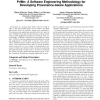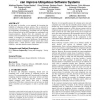123
Voted
EDOC
2006
IEEE
15 years 5 months ago
2006
IEEE
Enterprise Systems (ES) can be understood as the de facto standard for holistic operational and managerial support within an organization. Most commonly ES are offered as commerci...
145
click to vote
EDOC
2006
IEEE
15 years 5 months ago
2006
IEEE
Abstract-- Analysis of workflows in terms of structural correctness is important for ensuring the quality of workflow models. Typically, this analysis is only one step in a larger ...
105
Voted
EDOC
2006
IEEE
15 years 5 months ago
2006
IEEE
Workflow management systems (WfMS) have become a widely accepted software technology, which enables the effective management, execution, and monitoring of comput
103
Voted
EDOC
2006
IEEE
15 years 5 months ago
2006
IEEE
This paper discusses a novel implementation of a workflow engine that supports service-based applications. The applications are defined according to the GAT model, which is an eve...
128
click to vote
EDO
2006
Springer
15 years 5 months ago
2006
Springer
In this paper we describe a new approach for increasing the reliability of ubiquitous software systems. This is achieved by executing tests at run-time. The individual software co...
125
Voted
EDO
2006
Springer
15 years 5 months ago
2006
Springer
Embedded systems are rapidly growing in size, complexity, distribution, and heterogeneity. As a result, the traditional practice of developing one-off embedded applications that a...
124
click to vote
EDO
2006
Springer
15 years 5 months ago
2006
Springer
Businesses increasingly provide and use services, applying formal (Web) services technology for the description, composition, and management of software as services. At the same t...
119
click to vote
EDO
2006
Springer
15 years 5 months ago
2006
Springer
In this paper we present Damon, a decentralized wide-area runtime aspect middleware built on top of a structured peer-topeer (p2p) substrate and a dynamic Aspect Oriented Programm...







